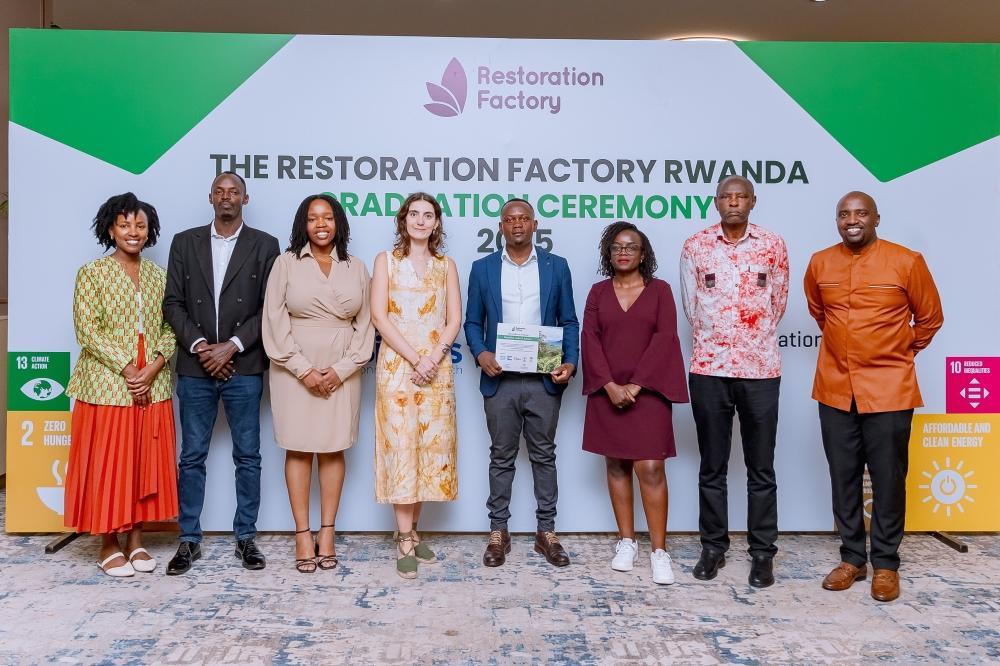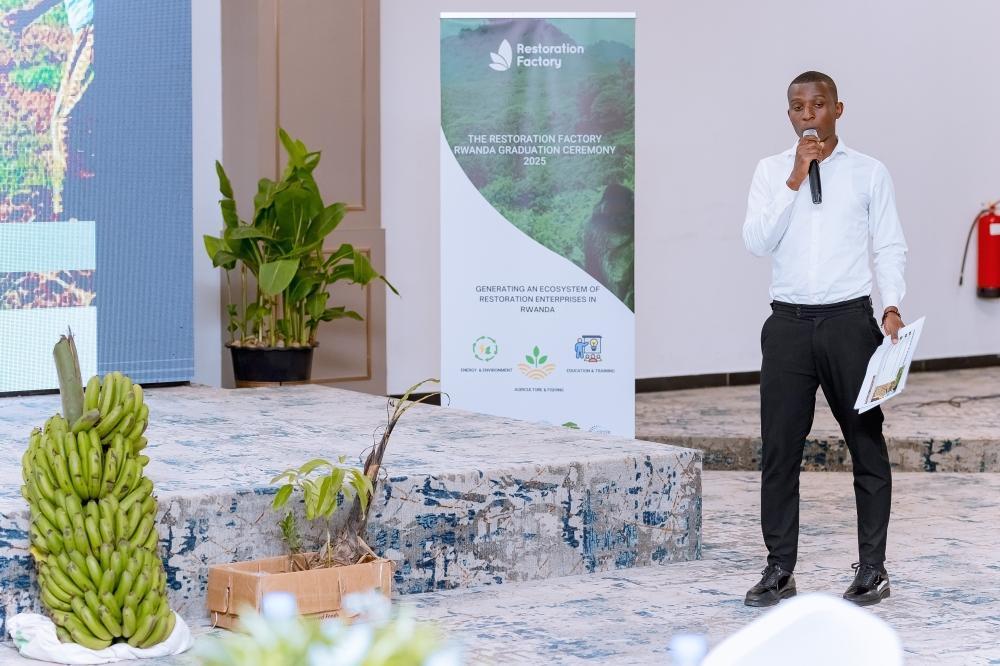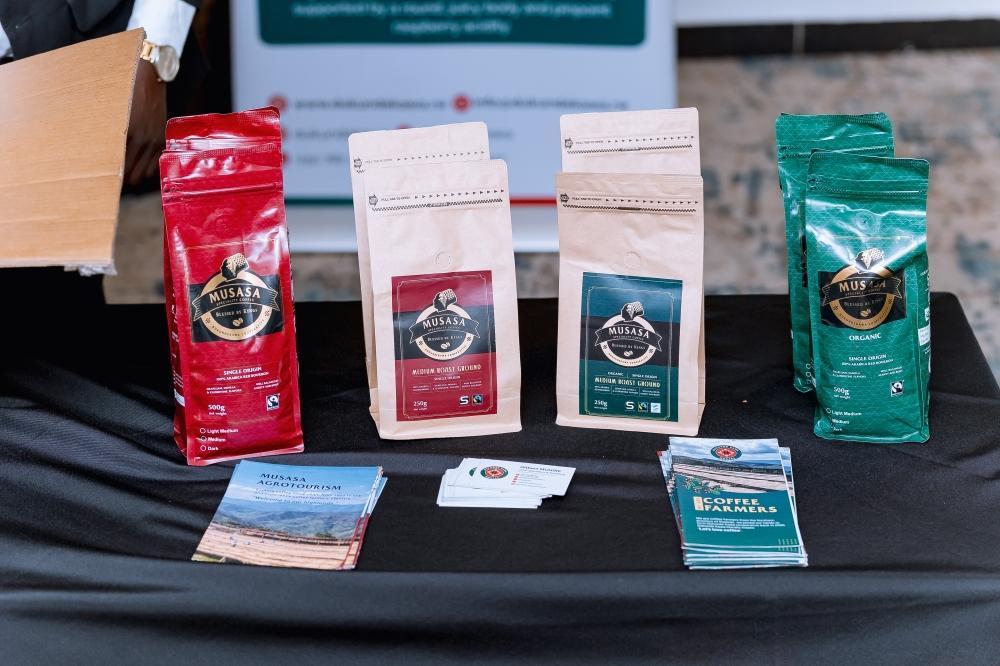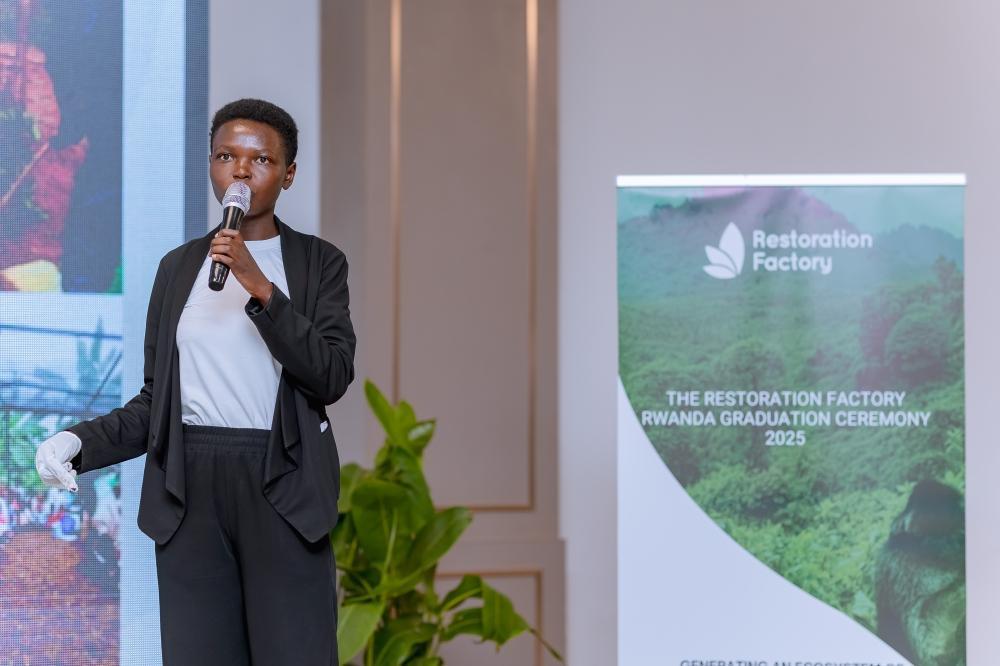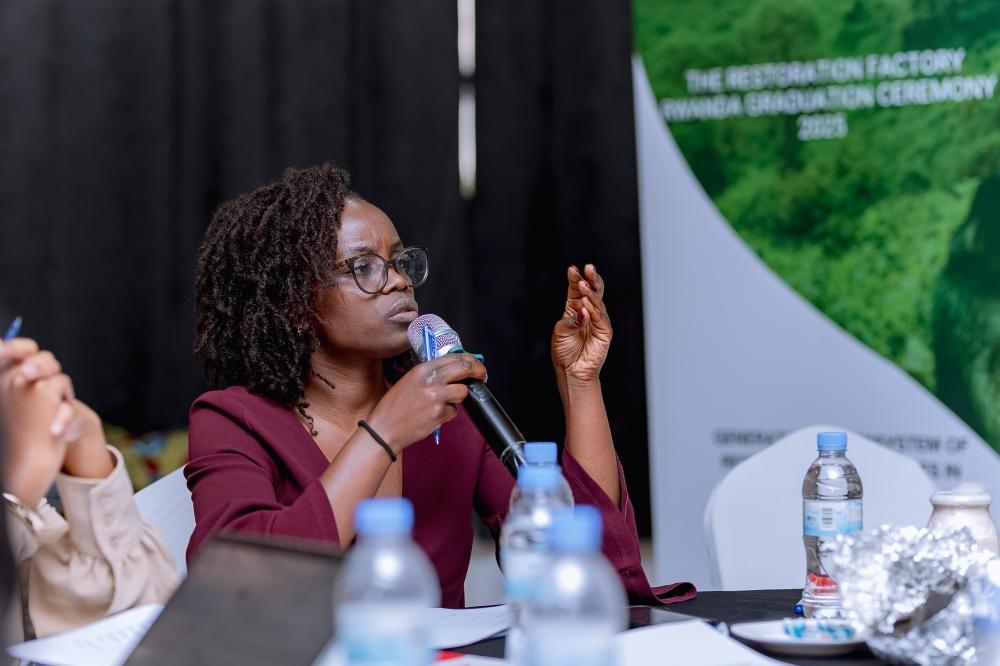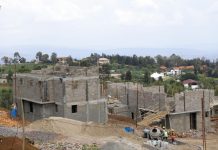Africa-Press – Rwanda. As delegates gathered in Brazil this year for the UN Climate Change Conference (COP), discussing strategies to curb global emissions and restore ecosystems, Kigali was quietly hosting Rwanda’s own climate revolution led by the youth.
Far from the grand halls of international diplomacy in Belem, young Rwandan innovators on November 14, showcased some of the innovative ideas they came up with, including some which are turning waste into wealth, while others are developing climate-positive enterprises which are contributing directly to Rwanda’s ambitious green growth agenda.
From transforming human hair, kitchen scraps, and milk waste into organic fertilisers to producing protein-rich animal feed from farm byproducts, these youth-led ventures are demonstrating that local solutions can deliver both environmental and economic returns.
Among other things, the startups are focused on improving agricultural productivity
At the centre of this movement is the Restoration Factory, an initiative implemented in Rwanda by the United Nations Environment Programme (UNEP) in partnership with Bridge for Billions.
The programme recently concluded a six-month incubation cycle in Kigali, guiding 45 young entrepreneurs through structured mentorship, business development, and access to funding.
Participating startups showcased solutions ranging from aquaponics and hydroponics systems to insect-based fertilizer production, each designed to reduce waste, create income opportunities, and promote sustainable practices at the community level.
Women leading the charge
Among the standout innovators is Josiane Mujawayezu, 25, founder and CEO of Amazing Insect. Her enterprise harnesses the ecological potential of insects, such as worms and black soldier flies, to convert organic waste from farms, kitchens, and restaurants into high-quality fertilizers and animal feed.
Some of the products young entrepreneurs are working on
“Through recycling organic waste, we are supporting both local economies and climate goals,” Mujawayezu explains. “This work allows us to create jobs for cooperative members while helping communities see waste as a resource rather than a problem.”
Her cooperative model involves six to eight people per cooperative, and she has trained over 60 individuals on the benefits of insect-based composting.
Already, regional markets in East Africa present opportunities valued at more than $1.5 billion, and Mujawayezu plans to scale operations further while running awareness campaigns on organic waste management.
Her journey into green entrepreneurship began with a simple observation: farms and kitchens in her community generated large amounts of organic waste that were often discarded or burned, contributing to greenhouse gas emissions.
By introducing insect-based processing, she turned these byproducts into marketable goods while creating income streams for local youth and women.
From Rubavu District, agronomist Ariane Uwimfura is tackling inefficiencies in mushroom production. Her company, Rally Agrisolutions Ltd, has developed an electric pasteurizing machine for mushroom tubes, eliminating the dependence on firewood and significantly reducing carbon emissions.
Previously, producing mushroom tubes relied heavily on firewood, costing around Rwf15,000 weekly while also causing contamination that reduced yields.
Uwimfura co-designed the machine with her engineer husband to precisely control temperature, preventing contamination while doubling production from 350 to 800 tubes weekly. Plans are underway to integrate solar power for a fully carbon-neutral process.
“This innovation increases productivity, reduces energy costs, and ensures a sustainable supply of mushrooms,” Uwimfura said. She also mentors local women on mushroom cultivation, providing both income opportunities and food security.
“Women should push themselves to innovate, not just wait for jobs. Use your knowledge to create impact,” she advises.
Christelle Igihozo, Senior Program Manager at Bridge for Billions, is another key figure in Rwanda’s youth-driven green innovation ecosystem. While not a founder of a business, Igihozo has played a pivotal role in guiding entrepreneurs to refine their strategies, measure environmental and social impact, and navigate business challenges.
“Supporting women and youth-led initiatives is critical because these ventures are often overlooked in traditional market systems,” she said.
Igihozo ensures participants of the Restoration Factory develop robust business models and learn to track measurable outcomes, which increases the likelihood of sustainable growth.
Turning waste into solutions
From a male perspective, Amon Muberuka, founder of Icyizere Consultant Ltd and Fumbila Organic Farm Technologies, operates in Nyagatare District, converting food and milk waste into protein-rich animal feed and organic fertilisers.
Muberuka’s inspiration stemmed from the Commonwealth Youth Government meeting in Kigali in 2022, where he observed how other countries leveraged networks to drive climate action.
Determined to contribute to Rwanda’s goal of reducing emissions by 38 percent by 2030, approximately 4.6 million metric tons of carbon dioxide, he developed a semi-automated system to process organic waste into viable agricultural products.
“Farmers face high feed costs and communities produce a lot of milk waste. We realized we could transform this waste into affordable, high-quality feed and fertilizers,” Muberuka said.
Today, he works with 30 cooperatives, collecting 20 tons of milk waste monthly. His products are priced at 900 Rwandan francs per kilogram, about 20 percent cheaper than imported alternatives, making them accessible while promoting environmental sustainability.
“We started small, using household waste that was usually discarded,” he said. “Now, we supply multiple cooperatives and help farmers reduce costs, improve yields, and protect the environment,” he says.
Hydroponics and aquaponics innovations
Other innovators are exploring hydroponics and aquaponics systems, integrating fish farming with organic crop production. Esther Uwimana and MJP Evan are developing scalable solutions for urban and peri-urban farmers.
Uwimana’s project combines ponds, aquaponics tanks, and vertical farming systems to optimize water use and maximize output. MJP Evan focuses on hydroponic vegetable production, training farmers in low-cost, sustainable methods that increase yields while conserving water.
These initiatives demonstrate how Rwanda’s youth are not only tackling organic waste but also addressing broader food security challenges through innovative, climate-smart agriculture.
Rounding out the top four innovators is Immaculée Namahirwe, founder of FromGreen Rwanda, whose initiative focuses on addressing malnutrition and poverty by donating avocado trees to families in Musanze District. These trees provide a sustainable source of food and income, ensuring long-term community resilience.
“Avocado trees are not just crops. They are tools for nutrition, income generation, and climate adaptation,” Namahirwe explained.
Her project identifies vulnerable families in rural communities and supports them in planting and caring for the trees, creating a model that combines environmental restoration with social impact.
FromGreen Rwanda emphasizes education alongside distribution, teaching families sustainable farming techniques, soil management, and the nutritional value of avocados.
Namahirwe hopes the initiative will inspire replication in other districts, scaling impact while contributing to Rwanda’s green growth and food security strategies.
Structured support for young innovators
The Restoration Factory program provides more than funding; it guides participants through a structured eight-module curriculum covering partner identification, value proposition, competition mapping, stakeholder engagement, business model development, pricing, financial projections, impact measurement, and growth planning.
Grace Kamere, Head of Programs at Circle Innovation, which supported the young entrepreneurs over the six months journey, says the ideas are scalable as long as the young startups continue to get the support they need.
“We focus on problem-solution fit, measurable impact, revenue streams, and team capability. Entrepreneurs must clearly articulate their value proposition and differentiate themselves from government or nonprofit programs,” she explained.
Kamere noted that many early-stage enterprises struggle to quantify impact or demonstrate financial viability, even with effective solutions. The Restoration Factory helps participants address these gaps, ensuring their ventures are both sustainable and scalable.
Recognising excellence
At the end of the six-month incubation, the top four innovators; Josiane Mujawayezu, Ariane Uwimfura, Amon Muberuka, and Immaculée Namahirwe, each received $2,500 in funding, awarded across categories such as Innovation, Socio-Environmental Impact, Female Entrepreneurship, and Local Impact. The remaining 29 graduates shared a completion pool of $11,000.
Maria Mira, Market Development Consultant at UNEP, stressed the importance of sustaining the network of innovators in order for them to have an impact on the society.
Maria Mira, representing UNEP at the pitching session and graduation event
“These entrepreneurs represent grassroots, community-led, nature-positive solutions. Supporting them ensures Rwanda’s green economy can grow with both environmental and economic returns,” she said.
Jean Pierre Nizeyimana, who represented the Ministry of Environment, highlighted the alignment with Rwanda’s Vision 2050, noting that each innovation contributes to high-income, low-carbon ambitions while creating employment and reducing emissions.
Women and Youth driving change
The projects stress the role of women in leading environmental innovation. Both Uwimfura and Mujawayezu combine technical expertise with mentorship, teaching community members skills that generate income while promoting sustainable practices.
Uwimfura encourages young women to leverage their education and skills to innovate. “Even if your first attempts fail, perseverance and passion will pay off,” she said. Mujawayezu adds that engaging local communities in the recycling of organic waste not only creates jobs but also fosters climate-conscious habits.
Namahirwe’s work also emphasizes youth engagement, encouraging young people to participate in tree planting and sustainable agriculture, linking climate action with social entrepreneurship.
Linking local action to global goals
These initiatives align with Rwanda’s Sustainable Development Goals, addressing zero hunger, affordable and clean energy, reduced inequalities, sustainable cities, responsible consumption, and climate action.
By turning waste into value-added products and planting trees that provide nutrition and income, these young entrepreneurs are demonstrating that local solutions can achieve tangible impact, supporting national and global sustainability agendas.
Mira emphasized the significance of grassroots-led innovation, whose impacts starts right from the communities.
“These entrepreneurs exemplify how local communities can drive systemic change. Their solutions complement policy-driven initiatives and show that youth-led innovation can address both social and environmental challenges,”
Community and economic impact
Beyond environmental benefits, these projects are creating employment and supporting local economies. Josiane’s cooperatives, Ariane’s mushroom training programs, Muberuka’s supply chain, and Namahirwe’s avocado tree initiative all generate jobs, empower women, and reduce input costs for farmers.
“Creating value from waste or planting sustainable crops isn’t just about the environment. It’s about livelihoods,” Muberuka explained. “Farmers save money, youth and women gain income, and communities benefit from sustainable practices.”
Namahirwe added that by integrating nutrition, income, and climate action, they create multi-layered benefits, with each avocado tree representing a long-term investment in health, resilience, and local economies.
Scaling and future prospects
With mentorship, funding, and technical guidance, participants are poised to scale their operations both nationally and regionally.
Mujawayezu plans to expand her insect-based production across East Africa, Uwimfura is exploring solar-powered mushroom cultivation, Muberuka continues to grow his cooperative network, and Namahirwe envisions replicating her avocado tree program in other districts.
Josianne Mujawayezu speaks about her initiative Amazing Insects. She is among the young people championing green growth initiatives. Courtesy
The combination of structured incubation, practical training, access to funding, and a supportive ecosystem is proving critical for turning innovative ideas into operational ventures.
Programs like the Restoration Factory provide a blueprint for other countries seeking to empower youth and promote sustainable entrepreneurship.
A bright future for innovators
Rwanda’s youth-led green economy is gaining momentum. As COP discussions in Brazil emphasized global climate urgency, Kigali’s innovators show that locally driven solutions can play a pivotal role in achieving sustainability.
Through structured programs, targeted funding, and ongoing mentorship, these entrepreneurs are transforming challenges into opportunities, waste into wealth, and ideas into actionable impact.
Their work demonstrates that with the right support, young people can lead the transition toward a high-income, low-carbon Rwanda by 2050, blending innovation, environmental stewardship, and economic development.
For Rwanda, these are more than pilot projects; they are part of a broader vision for sustainable growth, driven by the creativity, resilience, and determination of the country’s next generation of leaders.
The young entrepreneurs defended their projects before a panel of distinguished judges
For More News And Analysis About Rwanda Follow Africa-Press

